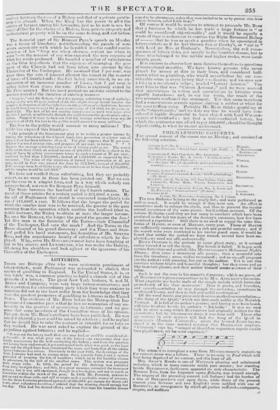LOTTERIES.
THERE are Bishops alive who were systematic purchasers of lottery-tickets, until Parliament was persuaded to abolish that species of gambling in England. In the United States, it is, or very lady was, a common praetiee to build a church out of the proceeds of a lottery. The great New York brokers, S. and M. ALLEN and Company, were very large lottery-contractors ; and the reputation for extraordinary piety which they were anxious to maintain did not in the least suffer from the knowledge that they were the greatest promoters of gambling in lotteries in the United States. The evidence of Mr. BIsit befOre the Metropolitan Im- provement Committee prtne,s that he has no conception of any im- morality in the 'nuclide of speculating in lotteries; - and we pre- sume that some members of the Committee were of his opinion. Extracts from Mr. Br sn's evidence have been puldished. He was asked if 60,000/.a year could be rai,ed by a lottery and be replied that he should like to take the contract at 100,000/. fur as long as they wished. He was next asked to explain the ground of the prejudices against lotteries ; and he replied- " It was not the lottery itself that tree was bad, or could be considered ob- jectionable ; it was what grew out of the lottery—an excrescence that was totally unnecessary for the weldeonducting the lottery ; and front the question nut having been understood, it got confounded with what was good, as Ore legal part ttud the illegal have been considered the saute, and from that all the odium against lottet ies has arisen. Previously to the year 1800, the drawings of the State Lotteries had used to occupy many days, (mostly forty,) and a system prevailed of insuring the fate a numbers ; which let itt the humbler classes to adventure, by the risk of the smallest Mlle. ThIS gyk.tetn was pregnant with many evils. In 11306, the period for the drawing was curtailed front forty to eight days; and this, in a great meastue, corrected the insurance System; but it was still continued, though in a less degree, and not so much as heretofore within the reach of the poor. In 1809, Mr. Perceval, anxious to Put an end to thew evils, anti still to retain such a profitable source of revenue. (its the State Lotteries produced upwatds of 320,0001. per annum for thirty odd years, clear voluntary taxation,) ordered that the drawing should occupy but one day. This had the desired effect ; and from that time the humbler classes erased to be adventurers, unless tbey were invited to be so by parties wino drew Private lotteries, called Little Goes."
Of course it would he useless to attempt to persuade Mr. Bisti that a business by which he has realm' a large fortune is " or could be considered objectionable and it would be equally a waste of lime to endeavour to convine the Right Reverend Bishop of --- that he was as much a gambler when he speculated in lotterv-tickets as if he Ind thrown dice at Crocky's, or "cut iii" with Lird DE Ros at Graham's. Nevertheless, the oil conse- quences of lottery risks, not merely to tine humbler classes, but to those who belonged to the middle and higher ranks, were Meal- culably great.
It is curious to observe how men deceive themselves in questions of conventional morality. We have known persons who never played for money at dice in their lives, and considered half- crown whist as gambling, who would nevertheless lay. out con- siderable sums in every lottery that was drawn ; amid we once saw a foie) in a merchant's ledge:., headed " Lottery Account." The next folio to that was "Cotton Account ;" and we were assured that speculations in cotton and speculations in lotteries were equally hazardous : and, to say the truth, the result of the two accounts confirmed the statement. Yet this same merchant had a conscientious scruple against playiniz a rubber at whist for the most trifling stake. Probably Mr. Bt.tt thinks gamblMg at cards "objectionable," and we dare say thee he would have con- sidered it hiehly disgraceful to have nlayod with Lord Wit ettx- CLIFFE at CrockfortEs : but that a web-conducted lottery, for which the contractor can afferd to ply 100,0001.,shouldbe thought objecti.nable, is whet he cannot understand.


























 Previous page
Previous page